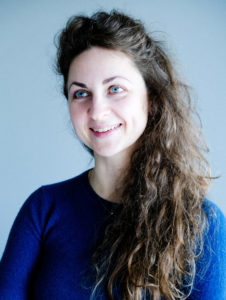Gintarė Venzlauskaitė, a researcher at KTU Faculty of Social Sciences, Arts and Humanities, who has recently obtained her PhD at the University of Glasgow, Scotland, today is already a thousand miles away. Dr Venzlauskaite is undertaking a four-month internship at one of the best in the world, Yale University in the US. A number of opportunities opened to Gintarė when she won the scholarship of Kazickas Family Foundation.

“It is still hard to believe that my candidacy was a success. I received my PhD just recently, and now – the good news from Yale. I am extremely grateful to both the Kazickas Family Foundation and the MacMillan Baltic Studies programme which made it all possible. I instantly got my motivation to get back to work”, says Dr Venzlauskaitė.
Many different reasons for (not) coming back to the homeland
During the internship at Yale, the young researcher will further investigate the issues related to returning and repatriation of displaced Lithuanians (and their diaspora), the topic that has emerged during her previous studies.
“Returning and repatriating is undoubtedly one of the cornerstones when it comes to the experience of migration and diaspora. The aspects of this topic are more sensitive in terms of forced migration and placement – because the return is often prohibited or impossible due to a particular threat. The issue of repatriation is relevant at both personal and state-levels”, Dr Venzlauskaitė explains.
The researcher says that in Lithuania this is easily demonstrated by discussions about the need of programmes that promote repatriation and socio-economic reintegration, by questions: are you or are you not planning to come back?
“There are many different reasons why migrants are coming or not coming back. Quite simply, for the diaspora caused by political migration the reasons of (not)returning will be political and for the economic migrants – economical. The return question itself was and will be relevant for all migratory waves. But different situations require different discussion dimensions, that are not always easily comparable despite certain emotional and symbolic similarities that come from returning (or not) experience”, says KTU researcher.
Yale University itself is a motivation
In terms of her internship expectations, KTU researcher has several of them. First of all, this visit gives her time to concentrate and to finish other work. The first in line is a monograph based on doctoral research. Also, she aims to analyse material that has not yet been covered.
“About Kazickas Family Foundation scholarship I have known for many years. I was determined to get the scholarship when I finish my PhD. There are not many similar opportunities, especially when talking about the support that favours researchers from Lithuania. And, of course, the name of Yale was a motivation itself”, says Venzlauskaitė.
She hopes to meet with local researchers of the same or relevant areas, to get acquainted with their work culture, methods, environment and to learn from the academic community of one of the most prestigious universities in the world. Therefore, she intends to participate in the university events, seminars, workshops while also observe lectures and to present her research and the results.
“I already have to admit to myself that the experience will be unusual, at least it will differ from the previous participants’ in this programme”, says Venzlauskaitė.
Due to current COVID-19 situation worldwide, Yale University functions differently. The university prioritises virtual lectures and remote work. The restrictions will reflect on usual academic activities there.
Empathy helps while conducting the interviews
When asked about how does being away from home affect her research, she says that her experience in some cases helped to acquire a connection with research subjects.
“Although I have never dared to compare my migratory experience to that of my research participants, which was often traumatic, coercive or life-threatening, but it is difficult to ignore some correlations. This is particularly evident in terms of sentiments concerning the relationship toward their homeland: the longing, romanticisation, returning and non-returning dilemmas while also personal perspectives on these topics”, explains Venzlauskaitė.
Each interview, according to her, is authentic, as the experience itself. She believes that personal experience sometimes might help to be empathetic.
“It is difficult to assess how my experience and attitude to life abroad influence the analysis of the topics in question. But I know that listening to diverse, multi-layered experience, that I got familiar with during the interviews with displaced people and their descendants, has pushed me to rethink personal experience and relation to the life abroad”, she points out.